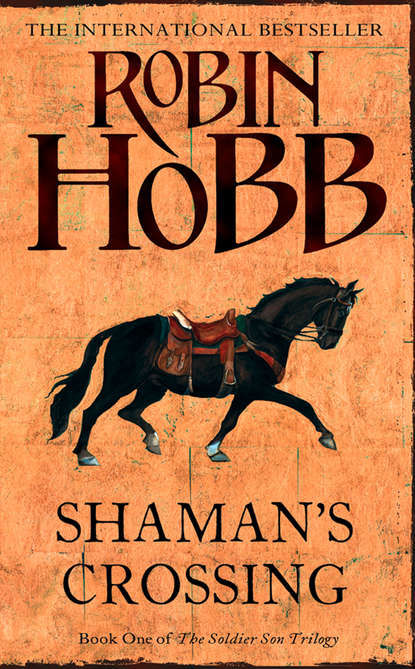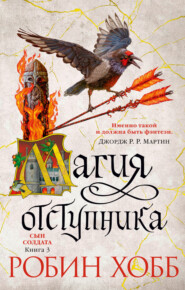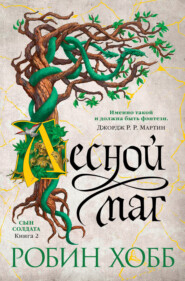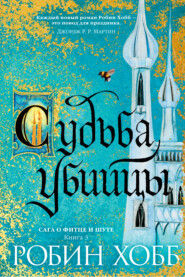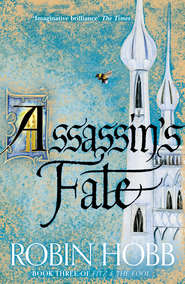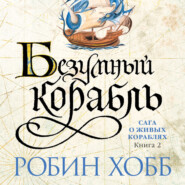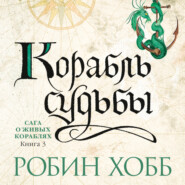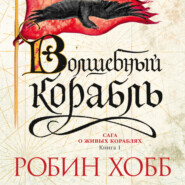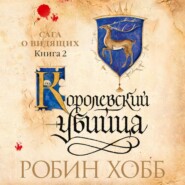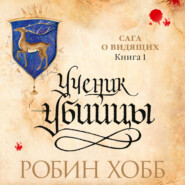По всем вопросам обращайтесь на: info@litportal.ru
(©) 2003-2024.
✖
Shaman’s Crossing
Автор
Год написания книги
2019
Настройки чтения
Размер шрифта
Высота строк
Поля
‘What lesson? What thing of value could he have learned from that heathen, other than how to die pointlessly?’ My mother was perilously close to tears. I knew as well as she did that if she broke, if she sobbed, my father would banish her to her rooms until she had regained control of herself. He could never abide a woman’s tears. Her voice was tight as she said, ‘He is a good son to you, willing, obedient and honest. What could he learn from a savage like that Kidona?’
‘To distrust.’ My father spoke so softly that I could barely hear him. I could scarcely believe that he spoke at all. He cleared his voice and went on more strongly. ‘I do not know if you can understand this, Selethe. This once, I will try to explain it to you. Have you ever heard of Dernel’s Folly?’
‘No.’ She spoke softly. I was not surprised that she had never heard of Captain Dernel. He was not renowned but notorious among the military. He was widely blamed for our having lost the Battle of Tobale to the Landsingers. A messenger had brought him orders from his general, telling Dernel to lead a charge into what was clearly a suicidal situation. Dernel had the advantage of the high ground. He could see for himself that the situation had changed since the order had been issued from the rear. He even said so to the orderly he left behind in his tent. Yet he had chosen to be an obedient soldier. He had obeyed a stale order, and led 684 mounted men to their deaths. He had obeyed, even though he had recognized the folly of the order. Every cavalryman knew about Captain Dernel. His name had become a synonym for an officer who did not lead but merely obeyed orders from above.
‘Well. Never mind that tale. I will say only that I do not wish my son to follow in Dernel’s footsteps. Nevare is, just as you have said, a good son. An obedient son. He obeys me without question. He obeys Sergeant Duril. He obeys you. He obeys. It is an admirable trait in a son and a necessary one in a soldier. These last few years, I have waited and watched him as he grew, waiting for him to disobey, to question, to challenge me. I waited for a time when he would be tempted to follow his own will. More, I hoped for a time when he would put his own judgment ahead of mine or ahead of Sergeant Duril’s.’
‘You wanted him to defy you? But why?’ My mother was incredulous.
My father gave a short sigh. ‘I did not think you would understand it. Selethe, I want our son to be more than an obedient soldier. I want him to rise through the ranks as much by his own aptitude as by our ability to buy a commission for him. To be a good officer, he must be more than obedient. He must develop leadership. That means making his own decisions, finding his own way out of bad situations. He has to be able to evaluate conditions in the field, and know when to follow his own instincts.
‘So, I deliberately put him into a difficult situation. I knew that Dewara would teach him many skills. But I also knew that Dewara would eventually put Nevare in a situation in which Nevare would have to make his own decisions. He’d have to question authority, not just Dewara’s, but mine in putting him there. It was a desperate tactic, I know. But he had shown no propensity of his own to grow in that direction. I knew I would have to push him across that boundary between boyhood and manhood. I hoped he would learn when to ignore orders given from the safety of the rear by men who do not know the conditions at the front. To trust his own judgment. To know that every soldier is ultimately in command of himself. To lead. To lead first himself, so that eventually he might learn to lead others.’ I heard my father shift in my chair. He cleared his throat again. ‘To know that not even his own father always knows what is best for him.’
There was a very long silence. Then she spoke in a voice cold with outrage. ‘I see. You gave our son’s welfare into the keeping of a vicious savage, so that Nevare would learn that his father did not always know what was best for him. Well. I have learned that lesson tonight. It is a pity that Nevare did not learn that lesson much earlier.’
It was the cruellest thing I’d ever heard my mother say to my father. I had never even imagined they had such conversations as this.
‘Perhaps you are right. In which case, he would not have survived long as a soldier anyway.’ Never had I heard my father’s voice so cold. Yet there was sorrow in his words. Did I hear guilt there as well? I could not abide that my father perhaps felt guilt over what had befallen me. I tried to speak, failed, and then tried to shift my hands. I could not, but I could move them back and forth on my bedding. I felt my fingers scratch shallowly against the linens of my bed. That wasn’t enough. I drew a deeper breath, braced myself for a great effort, and lifted my right hand. I trembled with the effort, but I held it up.
I heard my mother gasp my name, but it was my father’s rough hand that gripped my bandaged fingers. I had not understood that even my hands were wrapped in lint bandages until I felt his fingers close around mine. ‘Nevare. Listen to me.’ He spoke very loudly and clearly, as if I stood at a far distance from him. ‘You’re home now. You’re safe. You’re going to be all right. Don’t try to do anything just now. Do you want water? Squeeze my hand if you want water.’
I managed a feeble compression and a short time later a cool glass was held to my mouth. My lips were swollen and stiff; I drank with difficulty, soaking the bandages on my chin and then was returned to my pillows, where I sank into a deep sleep once more.
Later I would learn that I had been returned to my mother’s house, with a fresh notch cut deeply into my ear beside the first one for my disobedience, just as Dewara had promised. But that was not all he had done to me as I lay helpless. The barking of the dogs alerted my father that someone approached his manor house in the slight coolness of the early dawn. The taldi mare had hauled me up to my father’s doorstep on a crude travois made of brushwood. My clothes were in tatters, and some parts of me scraped to meat, for the rough conveyance had not completely protected me from being dragged against the ground. The exposed parts of my body were burned past blistering by exposure to the sun. At first glance, my father thought I was dead.
Dewara sat his mount at a distance from the house. When my father and his men came out into the yard to see what the disturbance was, he lifted a long gun and shot Keeksha through the chest. As she screamed, sank to her knees and rolled to her side, he turned his taldi’s head and galloped away. No one followed him, for their first concern was to get my unresponsive body clear of her dying kicks. Other than my doubly-notched ear and the slaughtered taldi, Dewara left no message for my father. I was later to learn that he either never returned to the Kidona or that his people concealed him and refused to surrender him to Gernian justice. His possession of a firearm was, by itself, a hanging offence for one of his folk. That he showed it so blatantly still makes me wonder if it were an act of defiance or one that invited his own death at my father’s hands.
My injuries were numerous, though only one appeared life threatening. I was dehydrated and burnt from exposure to the summer sun, and rubbed raw from being dragged home. My freshly notched ear was oozing thick blood when my father received me. A patch of scalp the size of a coin was missing from the crown of my head. The doctor summoned by my father shook his head after examining me. ‘Whatever is wrong with him, other than the burns and gouges, is beyond my skill. Perhaps he took a sharp blow to the skull. That may be the reason for his coma. I cannot tell. We will have to wait. In the meantime, we will do what we can for his other injuries.’ And so he picked gravel and dirt from my wounds, suturing and binding as he went, until I looked like a mended rag doll.
I come from a thick-skinned and hardy folk, my father said. Healing was painful and slow, but once I awakened from my long unconsciousness, heal I did. My mother insisted that my body be kept well greased to keep air away from my burns. It did serve to keep my fingers from sticking together as the old skin sloughed off to reveal raw pink newness beneath, but lying on greased linen when every inch of my body’s surface stung was a sensation I have never forgotten. The pungent agu kept most infection at bay, but left a reek that lingered in my bedchamber for weeks afterward. The wound on my scalp healed over, but no hair grew there.
Talking was painful, and for two days my father spared me any questions. My family had feared for my life, and I was uncomfortably aware, despite my usually bandaged eyes, that for every hour of the day either my mother or one of my sisters sat vigil by my bedside. That this duty was not entrusted to a servant was a sign of the depth of my mother’s concern.
Elisi was keeping the watch one afternoon when my father arrived. He shooed her from the room and then sat down heavily in my reading chair. ‘Son?’ he asked me, and when I turned my head slightly toward the sound of his voice, ‘Would you like some water?’
‘Please,’ I whispered hoarsely.
I heard him pour water into the glass by my bedside. I lifted my hand and nudged aside the greasy poultice across my eyes. My entire face had been blistered from the sun and the healing skin itched. My father watched as I very carefully levered myself into a more upright position. It was awkward to take the glass from him with both my hands in their mittenish bandages, but I saw that he was pleased to see me doing things for myself. That made it worth it. I drank and he took the glass from me quickly as I tried to fumble it back onto the bedside table. Beside it was my only souvenir of the experience. Sergeant Duril had insisted on helping put me to bed. He’d saved one of the rocks they’d dug out of my flesh and set it aside for me. It wasn’t much of a rock; some sort of quartz, I suspected, flecked and streaked with other minerals, but his reminder that I had once more cheated death was oddly cheering to me. Duril, at least, expected that someday I would look back on this painful time and find some amusement in this trophy.
My father cleared his throat to draw my attention back to him. ‘So. Feeling a bit more yourself now?’
I nodded. ‘Yes, sir.’
‘Think you can talk?’
My lips felt like burnt sausages. ‘A little, sir.’
‘Very good.’ He leaned back in his chair and thought for a bit, and then leaned toward me again. ‘I don’t even know what to ask you, son. I think I’ll leave it to you to tell me. What happened out there?’
I tried licking my lips. It was a mistake. Ragged bits of skin rasped against my tongue. ‘Dewara taught me Kidona ways. Hunting. Riding. How they make fires, what they eat. Bleeding a horse for food. Using a sling to hunt birds.’
‘Why did he notch your ear?’
I tried to remember. Parts of my time with him had gone muzzy and vague. ‘He had food and water, and would not share. So … I left him, to go find water and food of my own. He told me I couldn’t leave and I went anyway. Because I thought he’d let me die of thirst if I didn’t.’
He nodded to himself, his eyes alight with interest. He didn’t rebuke me for disobeying Dewara. Did that mean he thought that I had learned the lesson he’d sought to teach me? Was what had befallen me worth that lesson? I felt a sudden spark of hatred toward him. Resolutely I quenched it and forced myself to hear his question. ‘And that was all? For that, he did this to you?’
‘No. No, that was just for the first time.’
‘So … you left him. But then you went back to him for food and water?’ Disappointment tinged his question as well as confusion.
‘No,’ I denied it quickly. ‘He came after me, sir. I didn’t crawl back to him and beg him to save me. When I rode away from him that first time, he followed me. He chased me on horseback and notched my ear with his swanneck as I fled. I didn’t go back to him and stand still for him to mark me like that. I’d have died first.’
I think the vehemence in my voice shocked him.
‘Well, no, of course you didn’t, Nevare. I know you wouldn’t do such a thing. But when he came after you …?’
‘I rode a day and a half, and then found water for myself. I knew then that I’d survive. I thought I’d just come home from there. But he came after me, and that night I fought him, and then we talked, and after that, he taught me things, about how the Kidona survive and how they do things.’ I took a deeper breath and suddenly felt very, very tired, as if I’d fenced for hours instead of just conversing for a few minutes. I told him that.
‘I know, Nevare, and soon I’ll let you rest. Just tell me why Dewara did this to you. Until I know, from you, I don’t know how to respond to what he has done.’ A frown furrowed his brow. ‘You do understand that what he has done to you is a great insult to me? I can’t ignore it. I’ve sent men to find him; he will answer to me. But before I pass judgment on him, I must know the full tale of what drove him to this affront. I’m a just man, Nevare. If something passed between you that drove him to this fury … if, even unintentionally, you offered him great insult, then you should tell me that, to be an honourable man.’ He shifted in his chair and then scraped it across the carpet to come a bit closer to my bedside. He lowered his voice, as if speaking a great confidence to me. ‘I fear I learned a greater lesson than you did from Dewara, and one that is just as hard. I trusted him, son. I knew he would be harsh with you; I knew he would not compromise the Kidona ways for you. He was my enemy, never my friend, and yet he was a trusted enemy to me, if those words can ever be spoken together in such a way. I trusted his honour as a warrior. He gave me his word that he would teach you just as he would teach a young Kidona warrior. Then … to do this to you … I erred in my judgment, Nevare. And you paid the price.’
I considered my words carefully. I’d already thought through my experience. If I ever told my father how close I’d come to ‘going native’, he’d never respect me again. I found as much of the truth as I thought he could accept. ‘Dewara kept his word, Father.’
‘He went past his word. To notch your ear … I had the doctor put a stitch in each, son. There will be scars, but less than Dewara intended. That I could have accepted, since you admitted you disobeyed him. In truth, I expected you to come home with a scar of some kind. A scar is no shame to a soldier. But to expose you deliberately to the sun when you were helpless, to leave you parched and burning … he said nothing of that, nor have I ever heard of it as a punishment applied to Kidona warriors in training. I think he struck you in the head. Do you have any recollection of that?’
When I shook my head, mutely, he nodded to himself. ‘Perhaps you would not recall it. Head injuries can erase part of a man’s memory. I judge that you must have been unconscious for some time, to burn as you did.’
My thoughts swirled around his earlier admission. I said it aloud, to make him hear it from me. ‘You knew I’d disobey him. You knew I’d come home at least with a notched ear if he caught me.’
He paused for some time. I don’t think he’d expected to have to admit that to me. ‘I knew that might be a consequence of your training.’ He drew back a bit and looked at me, his head tilted. ‘Do you think what you learned from him was a fair exchange for that?’
I thought for a bit. What had I learned from him? I still wasn’t sure. Some physical skills in riding and survival. But what had he done to my mind? Had he taught me something, shown me anything? Or only drugged and deluded and abused me? I didn’t know but I was certain that my father would be of no help to me in answering those questions. Best not to even raise them. Best to make it possible for him to let it all go. ‘Probably what I learned is worth a few scars. And as you’ve told me before, a soldier must expect scars from his career.’ I hoped he would ask no questions when I added, ‘Father. Please. Just let him go. I wish this to be the end of it. I disobeyed him. He notched my ear as he said he would. Let it end there.’
He stared at me, torn between bewilderment and relief. ‘You know I should not do that, son. This leaving you next to dead on our doorstep … If we allow a Kidona to do this to the soldier son of a noble family and take no action … well, then we invite other plainspeople to do the same, to other families. Dewara won’t understand tolerance or forgiveness. He will respect me only if I command that respect.’ He rubbed the bridge of his nose as he added wearily, ‘I should have considered that more deeply before I put you in his power. I fear I see what I’ve done too late. I may have created unrest amongst the Kidona. Having done that, I cannot deny it or step away from it and leave it to others to handle. No, son. I must know the whole tale, and then I must take action on it.’
During his speech, I had begun to scratch gently at the sodden blisters, long burst, on my left forearm. The grease and butter treatment had left me sloughing soggy bits of skin like a river fish at the end of his migration. The temptation to peel it free was as great as it was juvenile. I was nudging gently at an itchy patch, not quite scratching it, and thus avoiding meeting his eyes.
‘Nevare?’ he prompted me after I had let a moment pass.
I made the decision. I lied to my father. I was surprised at how easily the words fell from my lips.
‘He took me up to the plateaus. He was attempting to teach me a manoeuvre for crossing a chasm. It seemed unwise to me, unnecessarily dangerous and I refused to perform it. I was, perhaps, too outspoken. I told him it was stupid, and only a fool would do it. He tried to force me; I struck back at him. I think I hit him in the face.’ My father would know that was mortal insult to a Kidona. Dewara’s reaction would now seem plausible. I paused, and then decided that was story enough. ‘That’s the last thing I remember until I woke up here.’
My father sat very still. His silence radiated disappointment in me. I did not wish I had told him the truth, but I did wish I had found a better lie. I waited for him to think it through. The blame for what had happened to me had to fall on either Dewara or myself. I took it upon my shoulders, not because I felt I deserved it, but because even at that young age, I could see far-reaching repercussions if I did not. If Dewara had injured me without serious provocation, my father must be relentless in his pursuit and punishment of the warrior. If I had brought it on myself, then it would be possible for my father to be less vengeful in his hunt. I knew, too, the far-reaching implications of taking the blame on myself; that others must then wonder why my father did not pursue Dewara implacably. There would be a taint of doubt about me; what had I done to the Kidona to deserve such an insult and injury? If my father could tell his associates that I had brought it on myself by striking the Kidona in the face, then it became understandable. My father would be a bit ashamed of me that I had not ultimately triumphed in a physical battle with the warrior. But he could take a bit of fatherly pride in that I’d struck Dewara. Belatedly, I wished I could revise my lie for I had said I’d refused to cross a chasm, and that did make me sound a bit of a coward. But it couldn’t be changed now, so I pushed those thoughts aside. I was in pain and weary and often, during my convalescence, felt that my thoughts were not quite my own.
I did not, for even an instant, consider trying to explain my truth to my father. That was how I had come to think of it in the days of fitful wakefulness since it had occurred. My truth was that, in a dream, I had failed to follow Dewara’s command to kill the tree woman. I had disobeyed him, thinking I knew better. I hadn’t. He had warned me that she was a formidable enemy. I’d not struck when I had the opportunity to kill her. I would never know what would have happened if I had rushed forward the moment I first saw her and slain her. Now I would live with the consequences. I’d died in that dream place, and as a result, I’d nearly died in this world, too. I wondered if there were any way I could even discuss that ‘dream’ with my father. I doubted it. Ever since I had learned my father’s secret opinion of me, ever since I’d heard him express to my mother his reservations about my fitness to command, I’d felt an odd distance from him. He’d sent me out to be tested by a hostile stranger, with never a word of warning. Had he ever even considered that I might not come back from such a test? Or had that been an acceptable risk? Had he coldly judged that it would be better to lose me now as a son rather than risk disgrace from me when I was a soldier? I looked at him, and felt sick with anger and despair.
I quietly spoke the first words that came to me. ‘I don’t think I have anything else to tell you right now.’





